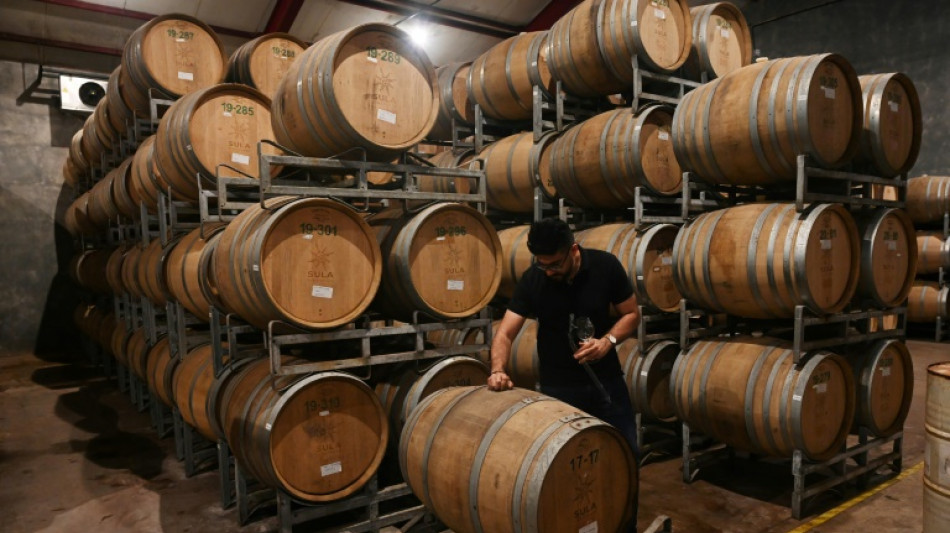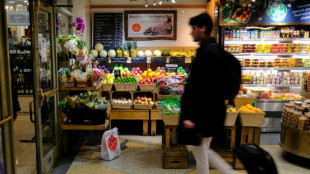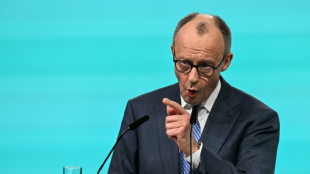
-
 Ukraine Paralympics team to boycott opening ceremony over Russian flag decision
Ukraine Paralympics team to boycott opening ceremony over Russian flag decision
-
Wales captain Lake wants fans to bring 'noise' against Scotland

-
 Skier Vonn's Italian hospital a hotbed of men, sister says
Skier Vonn's Italian hospital a hotbed of men, sister says
-
India target S.Africa top order, Abhishek to come good: bowling coach

-
 Carrick praises Man Utd 'diversity' after Ratcliffe's immigrant rant
Carrick praises Man Utd 'diversity' after Ratcliffe's immigrant rant
-
I never thought it would be hit, says 'Scream' creator 30 years later

-
 AI summit statement delayed to 'maximise' signatories: India
AI summit statement delayed to 'maximise' signatories: India
-
Barcelona's Sagrada Familia basilica hits peak height

-
 Milan sprints to second straight UAE stage win as Tiberi keeps lead
Milan sprints to second straight UAE stage win as Tiberi keeps lead
-
US GDP growth misses expectations as Trump blames shutdown

-
 Benfica investigate video of fans' monkey gestures
Benfica investigate video of fans' monkey gestures
-
French minister pledges tight security at rally for killed activist

-
 Guardiola 'couldn't care less' about Arsenal stumble in title race
Guardiola 'couldn't care less' about Arsenal stumble in title race
-
UK police search property as royals reel from Andrew's arrest

-
 Germany's Merz to visit China next week
Germany's Merz to visit China next week
-
Kompany says Mourinho made 'huge mistake' in Vinicius racism row

-
 X appeals EU's 120-mn-euro fine over digital content violations
X appeals EU's 120-mn-euro fine over digital content violations
-
Galthie recalls hulking locks Flament, Meafou for Italy

-
 Turkey, Saudi sign major solar power deal
Turkey, Saudi sign major solar power deal
-
US Olympic freeskier Hess embraces 'loser' tag after Trump blast

-
 European stocks rebound, oil prices ease after US-Iran volatility
European stocks rebound, oil prices ease after US-Iran volatility
-
'Alpha male' AI world shuts out women: computing prof Hall

-
 New Zealand freestyle skier Ives in hard Olympic crash
New Zealand freestyle skier Ives in hard Olympic crash
-
New Zealand must adapt quickly to Sri Lanka wickets: Chapman

-
 Thai activist's jail term for royal insult extended to 30 years
Thai activist's jail term for royal insult extended to 30 years
-
Families of Duterte's drug war victims eye Hague hearing with hope

-
 India chases 'DeepSeek moment' with homegrown AI
India chases 'DeepSeek moment' with homegrown AI
-
UN touts panel for 'human control' of AI at global summit

-
 Ukraine Paralympics team to boycott Opening Ceremony over Russian flag decision: statement
Ukraine Paralympics team to boycott Opening Ceremony over Russian flag decision: statement
-
UK monarchy reels from Andrew's stunning arrest

-
 Somaliland, where Muslims love Israel
Somaliland, where Muslims love Israel
-
Florida airport to be renamed after US President Donald Trump

-
 Fans flock to Japan zoo to see viral baby monkey Punch
Fans flock to Japan zoo to see viral baby monkey Punch
-
Stocks mixed, oil rises after Trump Iran threat

-
 Outspoken Laos lawmaker's election exit sparks rare dissent
Outspoken Laos lawmaker's election exit sparks rare dissent
-
Kim Jong Un vows to boost living standards as he opens rare congress

-
 Shepherd hat-trick to Samra ton: Five top T20 World Cup performances so far
Shepherd hat-trick to Samra ton: Five top T20 World Cup performances so far
-
Zimbabwe surprise as T20 World Cup Super Eights begin without Australia

-
 Victorious Takaichi promises 'strong and prosperous' Japan
Victorious Takaichi promises 'strong and prosperous' Japan
-
Ex-South Korea leader apologises for martial law crisis

-
 Ex-S. Korea leader apologises for martial law crisis
Ex-S. Korea leader apologises for martial law crisis
-
Messi kicks off MLS season in key World Cup year

-
 Teen burnout to Olympic gold: Alysa Liu 'looking to inspire others'
Teen burnout to Olympic gold: Alysa Liu 'looking to inspire others'
-
Cunningham stars as NBA-leading Pistons ease past Knicks

-
 Andre Gomes joins MLS side Columbus Crew
Andre Gomes joins MLS side Columbus Crew
-
Scottish inconsistency 'bugs everyone' says former international Beattie

-
 England turn to Pollock for Six Nations boost against Ireland
England turn to Pollock for Six Nations boost against Ireland
-
Arsenal aim to banish title jitters in Spurs showdown

-
 Scrutiny on Flick rises as Barca seek recovery
Scrutiny on Flick rises as Barca seek recovery
-
Leipzig host red-hot Dortmund with Champions League hopes slipping away


Grape expectations: India's biggest winemaker seeks millions
India's largest winemaker Sula Vineyards is heading to the stock market, betting on the diversifying tastebuds of a booming urban middle class in a country that has long favoured strong liquor.
Wine makes up less than one percent of India's massive alcohol market, with spirits the overwhelming drink of choice in the nation of 1.4 billion people.
On average, Indians each drink only a few spoonfuls of wine a year, but producers hope the country will replicate the wine boom in China when its economy took off in the 1980s.
Still, experts warn their rosé ambitions are tempered by uncertainties including the impact of climate change on viniculture, and an Australian trade deal lowering import tariffs.
"Wine's time has come," insists Sula's founder and CEO Rajeev Samant.
When the Stanford University graduate returned from California, he initially tried growing roses and mangoes on family-owned land near Nashik, an ancient holy city about 160 kilometres (100 miles) from financial hub Mumbai.
"Where Sula is today, it was just grassland. There were leopards and snakes. There was no electricity, there was no telephone line," as if it was a century earlier, Samant told AFP.
"I saw some beauty here, there was something about the place that really struck me."
India is one of the world's biggest grape producers and Nashik is one of its key regions, but back then the vines were all table grapes for eating and raisins, rather than wine grapes.
Samant was inspired by his visits to California's Napa Valley wine country.
"Why not try to make a decent, drinkable wine right here in India, proudly made in India?" he thought. "And that's what I decided to do."
Named after Samant's mother Sulabha, Sula planted its first vines in 1996, later building a sprawling resort and helping to cultivate a new reputation for Nashik as India's wine capital.
Applications for shares in its IPO open next week, it said Wednesday, with its owners selling around a third of the company for up to 9.6 billion rupees ($116 million), valuing it at about $350 million.
- Sweet tooth -
Higher-priced Indian wines are becoming comparable to their international peers in terms of quality, according to Ajit Balgi, founder of Mumbai-based wine and spirit consultancy The Happy High, although they remained "Indian style" in flavour.
"They won't be tasting the same as an Australian or a French wine," he said. "India is too close to the equator, so our grapes that we choose are the riper ones."
New drinkers tended to have a sweet tooth and were attracted to "jammier" wines, he added. "Most start their association with wine with sangria."
Wine consumption in India has risen from negligible levels in 1995, while women drinking in public has become more acceptable as more joined the workforce, but volumes still stood at just 20 million litres last year, according to the International Organisation of Vine and Wine.
Mumbai businessman Parimal Nayak is a fan, and visited the Sula vineyard with his family to celebrate his 44th birthday.
"Sula wines has improved a lot... and the atmosphere here is good," he told AFP. "I'm proud of it."
But the biggest obstacle to expansion was cost, said Balgi.
Wine is often taxed at similar levels to spirits in many Indian states, despite having much lower alcohol content.
"The price of a basic Indian wine is comparable to that of a full bottle of rum or basic whisky," he said. "There is not much wine consumption in India because the masses cannot afford it."
- Last glass -
Sula reported revenues of 4.5 billion rupees and a net profit of 521 million rupees in the last financial year, and saw average annual revenue growth of more than 13 percent in the decade to March 2022.
Samant, 55, plans to sell around five percent of his 27 percent stake in the firm.
But several recent Indian tech IPOs have flopped. Payments firm Paytm has lost three-quarters of its value since listing a year ago, and analysts say many firms are overvalued.
Previous wine pioneer Indage Vintners delisted in 2011 after debt and cash problems.
Sula could face increasing competition from foreign wine, which currently makes up 17 percent of the Indian market.
A recent trade pact with its biggest supplier Australia will cut import duties for some wines from a punishing 150 percent.
Sula, meanwhile, warned in its IPO prospectus about the risk of "adverse climatic conditions" affecting grape quality.
Farmers in Nashik were already reporting floods and droughts nearly a decade ago, said the Mumbai-based World Resources Institute India's climate programme manager Prutha Vaze.
Higher average temperatures also hasten grape ripening, lowering acidity and increasing sugars, which raises alcohol levels in wine. These changes impact a wine's delicate balance of flavours, experts say.
If growers do not adapt to the changing climate, Vaze said, "there could be a day where we are... biting on the last piece of chocolate or having the last glass of wine".
B.Finley--AMWN

